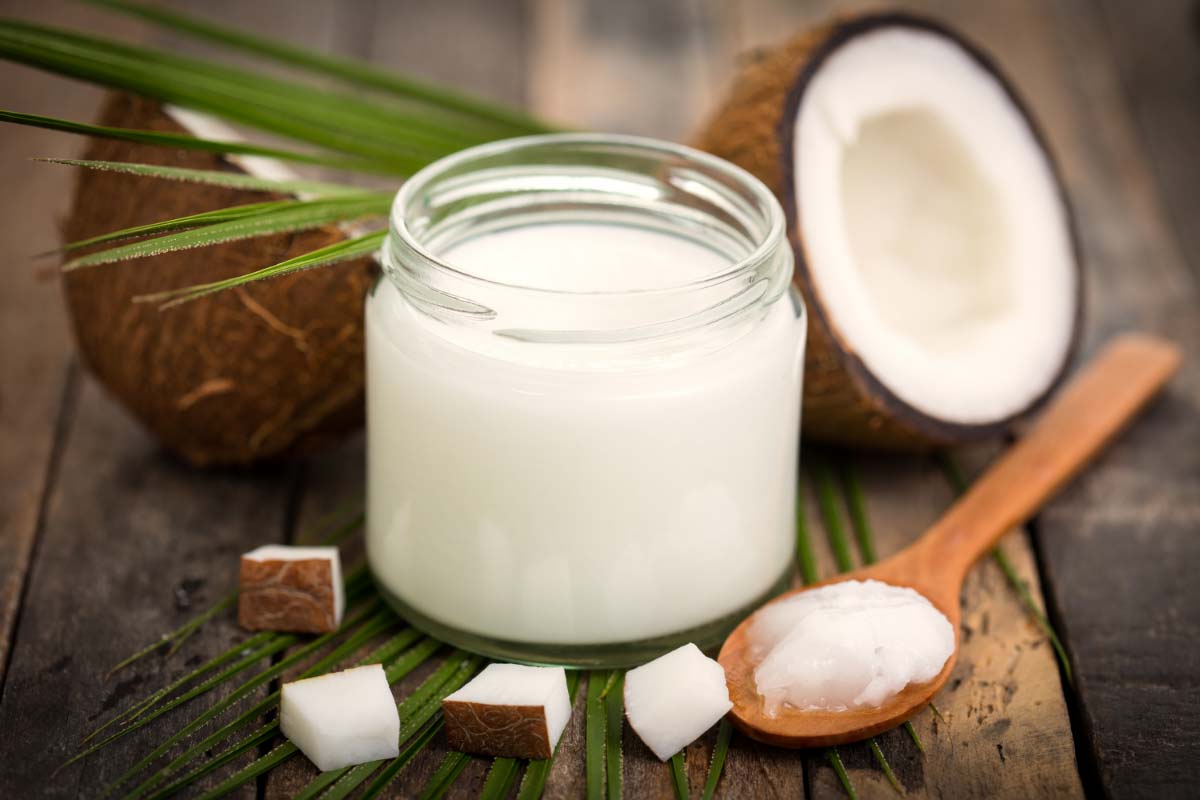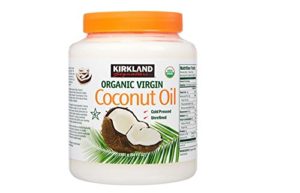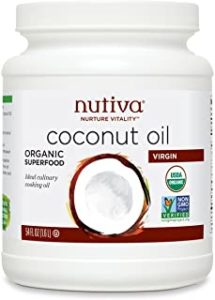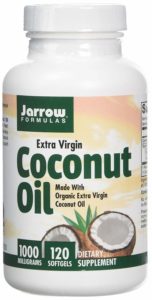Coconut oil is a plant oil which is extracted from the meat of mature coconuts and is produced by the Philippines, Indonesia, India, and Viet Nam (1). According to the USDA Nutrient Database, one tablespoon of coconut oil contains 121 calories, 13g of fat (11g saturated), zero carbohydrates, zero fiber and zero protein. It is high in saturated fats and high in medium-chain triglycerides, also known as MCTs (2).
Medium-chain triglycerides make up 60-70% of the fatty acids in coconut oil (which themselves makeup 92% of the oil) (3).
Best Coconut Oil
1. Viva Naturals Organic Extra Virgin Coconut Oil
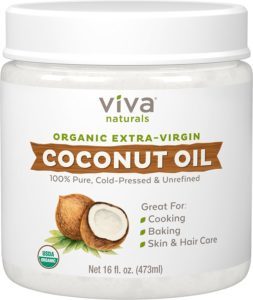
This option can be used for not only the traditional cooking methods that have become popular among users but also skin and health care for more topical needs. Additionally, the Viva Naturals Organic Coconut oil is cold-pressed from organic coconuts to provide a rich aroma and flavor.
All of the ingredients used are gluten-free, non-GMO, and USDA certified, which makes it a fantastic option for those on a keto, paleo, or gluten-free lifestyle plan. For these reasons, it’s our #1 pick.
2. Island Fresh Superior Organic Virgin Coconut Oil
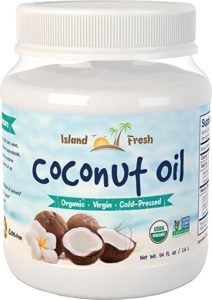
This organic coconut oil option not only comes in a larger size than its counterparts, giving you more for your money but also has some additional benefits not found in the majority of coconut oil options.The metabolism support contained within Island Fresh’s coconut oil provides a source of energy and weight management for consumers.
It can be used as a daily supplement for mental focus and endurance enhancer. This coconut oil also contains no GMO ingredients that are certified organic and are ideal for multiple uses including cooking, hair care, and skincare.
3. Kirkland Signature Organic Virgin Coconut Oil
Kirkland’s Signature Organic Virgin Coconut Oil is another health industry juggernaut that far surpasses standard expectations in terms of quality. Their organic virgin coconut oil provides a product that is both cold-pressed and devoid of any chemical treatment.
As a natural product, it is important to note that only is Kirkland’s option certified organic but also certified kosher. Overall, a great purchase for anyone looking for a one-source solution for their coconut oil needs.
4. Carrington Farms Cold-Pressed, Virgin Organic Coconut Oil
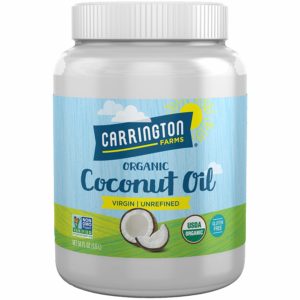
One defining factor of this brand is its commitment to sustainability and earth-friendly products.
As its products are non-chemically treated and come in BPA free packaging, users can get the benefits of coconut oil while ensuring their usage is safe for the planet as a whole. Carrington Farms has created a very versatile product that can be used for not only for cooking but also beauty and healthcare needs.
5. Nutiva Organic Unrefined, Virgin Coconut Oil
Nutiva’s Organic Unrefined, Virgin Coconut oil comes in multiple sizes to better fit the needs of each customer. Nutiva’s organic coconut oil is not only free of chemicals and filled with organic ingredients, but it is also certified vegan, vegetarian, and gluten-free. This makes it one of the most ideal solution for customers with a range of dietary needs.
Additionally, it contains 63% medium-chain triglycerides and 50% lauric acid for those who are pregnant and plan on breastfeeding their newborn. Overall, Nutiva’s coconut oil option is by far one of the most well-rounded choices one can make.
6. Garden of Life Organic Extra Virgin Coconut Oil
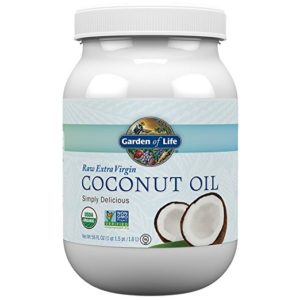
The Garden of Life Organic Extra Virgin Coconut Oil is one of the best options available for vegans and vegetarians on the market. As a certified vegan product, it differentiates itself from other choices that may have natural ingredients, but may not fulfill the criteria needed to be safe for vegans.
Like many other coconut oil products, this option comes in a cold-pressed form that can be used to cook, maintain skin health, and enhance a hair care routine as well.
7. Majestic Pure Fractioned Coconut Oil
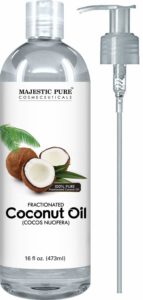
Majestic Pure Fractioned Coconut Oil is a fraction of the coconut oil from which almost all the long-chain triglycerides are removed, thus leaving mainly the medium-chain triglycerides and making it a great MCT oil. It does not become solid like regular coconut oil but keeps all the great properties. It has a very long shelf life.
Fractioned coconut oil is also a great carrier for blending with essential oils. It can be mixed with other more expensive carrier oils.
8. Nature’s Way Organic Extra Virgin Coconut Oil
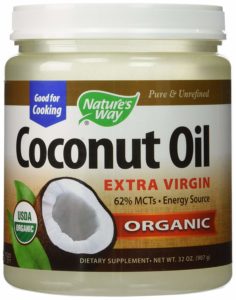
Nature’s Way Organic Extra Virgin Coconut Oil is Pure, cold-pressed, organic, non-GMO, USDA Certified Organic, unrefined, unbleached, extra virgin coconut oil. It’s also hexane-free and gluten-free.
It contains 62% MCTs (medium-chain triglycerides) for maximum metabolic benefits as well as taste.
9. Jarrow Formulas Extra Virgin Coconut Oil
Though there has been a significant focus on coconut oil that can be used in multiple ways, there are options for those who would prefer to use this oil as a supplement. Jarrow Formula’s coconut oil comes in a soft gel form, allowing for no cleanup.
For those looking for the benefits of coconut oil without any of the maintenance needs required with a liquid or oil form, this is a great choice. All ingredients are all-natural. This option does include gelatin, so while not a good choice for vegans, it is still a great option for those using a more general health plan.
10. Prasada Organic Refined Coconut Oil
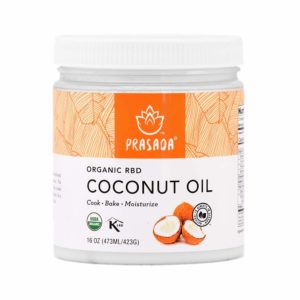
While considerably newer than some of the other options provided, Prasada is slowly making its name if the healthcare industry. Its organic refined coconut oil is highly versatile and has numerous qualities that make it a superior product.
One of Prasada’s most advantageous features is its commitment to maintaining the medium-chain triglycerides found naturally in coconut oil. Expeller pressed, this coconut oil provides a substantially cleaner and more organic product than some others available on the market today.
How We Rank
When ranking our coconut oil, there were a few factors to consider to find the best on the market.
The first thing we looked at was if the coconut oil refined or unrefined. Unrefined coconut oil is a natural oil, made from fresh coconut meat that’s not been dried. The resulting oil is a high-quality crude, pure coconut oil, made without additives and often labeled as virgin coconut oil.
Some refined coconut oils are heated to a high temperature to kill germs and bacteria. Some processes use chemicals to filter the oil further, this coconut oil is known as RBD (refined bleached deodorized) and is not the best to use as edible oil. As such, unrefined coconut oil, such as Viva Naturals (our top pick), was preferred over Majestic fractioned coconut oil, despite both being high quality.
Secondly, we looked at whether the coconut oil was organic or not. For our rankings, organic was preferred to ensure quality control.
Lastly, we looked at what else was in the coconut oil product. Was it only coconut oil? Or did it have fillers, additives, and coloring? Any product that additional flavorings, dyes, or colors were eliminated.
Benefits
1. Coconut oil may help to improve cognitive performance and help combat Alzheimer’s disease. In a 2012 study on the effects of fish oil on cognition, coconut oil was used as the control. The study found that coconut oil had a small yet significant effect on processing speed (how long it takes a person to complete a mental task) (5).
A study on Alzheimer’s patients found that administering 40ml of extra virgin coconut oil per day led to improvements in cognitive performance – particularly in women and type II diabetics. They hypothesized that this was due to the body using MCTs as “a direct source of cellular energy” (6).
Another study, in 2014, found that coconut oil could help reduce neurodegeneration, again potentially demonstrating its effectiveness for treating Alzheimer’s patients (7).
An article by Larissa DeDea in the Journal of the American Academy of Physician Assistants looked into whether coconut oil was a potential replacement for caprylidene (a medical drug used to increase blood ketone levels) (8).
Because coconut oil is mostly made up of MCTs it is often used in ketogenic diets to raise blood ketone levels, making it a good choice. Larissa decided that it was an acceptable replacement, provided that patients’ cholesterol was checked regularly.
2. Coconut oil may help improve lipid profiles and reduce cholesterol. A common mistake made by people is to believe that any food that is high in saturated fats is automatically going to increase your cholesterol. While this is often the case, plant-based saturated fats can often have the opposite effect.
A study in 2004 by Nevin & Rajamohan found that feeding virgin coconut oil to rats for 45 days led to reduced total cholesterol, reduced triglycerides, reduced low-density lipoprotein (LDL) cholesterol, and increased high-density lipoprotein (HDL) cholesterol. Virgin coconut oil also helped prevent LDL oxidation (9).
Another study, this time on humans (premenopausal women in the Philippines) was published in 2011 in the Asia Pacific Journal of Clinical Nutrition (10).
It found that consuming coconut oil was associated with an improvement in HDL cholesterol levels. Increasing HDL cholesterol can help remove bad cholesterol (LDL), reduce total cholesterol and reduce your risk of heart conditions.
3. Coconut oil can help reduce the risk of cardiovascular disease and works as a cardioprotective. A 2014 study looked at the effect of heated virgin coconut oil on hypertensive rats (11).
The rats were given heated palm oil for 16 weeks, with one group also being given a supplement of virgin coconut oil. At the end of the 16 weeks, all of the rats had increased systolic blood pressure except for the group that had the virgin coconut oil. This study found the coconut oil had a cardioprotective effect.
An article in Postgraduate Medicine (2014) looked at the cardioprotective effects of virgin coconut oil. The researchers concluded that there wasn’t enough evidence at the present time, but that the outlook seemed good. They hypothesized that virgin coconut oil could be as effective for cardioprotection as virgin olive oil is in the Mediterranean diet (12).
4. Coconut oil may possess a hepatoprotective effect. There aren’t many studies on the effect of coconut oil on your liver. A study in 2011 in Evidence-based Complementary and Alternative Medicine found that virgin coconut oil reduced liver damage (caused by paracetamol) in rats. The study concluded that virgin coconut oil “possessed a hepatoprotective effect that requires further in-depth study” (13).
Another study on rats, this time in the Journal of Basic & Clinical Physiology and Pharmacology also found that virgin coconut oil (or more specifically one of the active components of the oil) had a protective effect on the liver (14).
5. Coconut oil may reduce skin dryness and increase skin moisture. You don’t have to consume coconut oil as part of your diet to get all of its benefits. You can also see improvements in your skin from applying it topically. A study in 2008 found that applying coconut oil to skin suffering from dermatitis helped to rehydrate it and reduce bacteria (a common cause of dermatitis) (15).
A similar study in2004 found that coconut oil was as effective as a moisturizer at rehydrating dry skin (16).
6. Coconut oil may slightly increase metabolism for short durations. A study on premenopausal women in 1999 found that ingesting coconut oil led to a small increase in their metabolism after a meal (enhanced postprandial energy expenditure). This effect only lasted for two weeks and after that time there was no difference in energy expenditure (17).
7. Coconut oil may have slight anti-inflammatory properties. A 2011 study found that coconut oil had an anti-inflammatory effect, but that the effect was not strong (18).
This is due to the high concentration of lauric acid that coconut oil contains.
These were the benefits that are directly tied to coconut oil. The studies referenced all specifically used coconut oil. The following benefits are attributed to MCTs which are present in coconut oil, so while the studies may not use coconut oil, you can still attribute the benefits to it.
8. MCTs may help to increase weight loss and fat oxidation. A 2007 study looked at the effect of medium-chain triglycerides on weight loss and insulin sensitivity (19).
The study involved 40 moderately overweight type 2 diabetics and lasted 90 days.
One group was given medium-chain triglycerides while the other group was given long-chain triglycerides (from corn oil). The MCT group noticed reduced body weight, reduced waist circumference, and a decrease in total cholesterol. The LCT group noticed no significant changes. Another study in 2000 found that MCTs helped increase fat oxidation in healthy women (20).
The study concluded that MCTs can have a role in weight management.
In 2001 a study by Krotkiewski was published in the International Journal of Obesity & Related Metabolic Disorders (21).
The study’s aim was to test the effects of MCTs during a low-calorie diet. It was performed on obese women who were split into three groups. The groups were: MCT enriched, LCT enriched, and low fat/high carb. All groups had the same calorie targets.
The study found that the MCT group had a significantly higher fat loss, a larger reduction in body weight and that their free fat mass (muscle) was better spared during the diet. This was attributed to a larger increase in ketone bodies as the body entered ketosis.
The researchers concluded that further research was needed on the “protein-sparing and appetite-suppressing effects of MCT supplementation”. Further studies have as-yet failed to find a significant appetite-suppressing effect of MCT supplementation.
9. MCT supplementation (or coconut oil) could be more effective during a ketogenic diet. As we saw in the previous study, the researchers attributed the weight loss to the raised ketone bodies in the blood. Raising the ketone blood levels is the goal of anyone participating in a ketogenic diet. If you’re looking at speeding up the process of entering ketosis, adding coconut oil to your diet could be very beneficial.
As you can see there are quite a few benefits attributed to coconut oil and medium-chain triglycerides in general. More studies on humans are needed, but the research to date appears promising.
Ketogenic diet practitioners all rave about coconut oil and its ability to help you enter ketosis easily, plus the many other supposed benefits. It appears that if you were to use ketosis for short term fat loss, the brief increase in metabolism that coconut oil displayed in the 1999 study might be beneficial.
10. Coconut oil can improve fertility. When trying to conceive, fertility is a constant concern. Though science has made amazing strides, coconut oil has many benefits for those looking to conceive.
Medium-chain triglycerides have been found to cause the loss of belly fat at a faster rate than other chemical components in the human body. Fat composition is a key factor when trying to get pregnant and those consuming coconut oil benefit from the number of medium-chain triglycerides it contains.
Coconut oil has also been found to regulate insulin secretion, balance vaginal pH, and boost thyroid performance. All of these are key elements that should be present for a couple trying to have a child.
11. Coconut oil use could be beneficial during pregnancy. During pregnancy, multiple considerations should be made for both the health of mother and baby. Coconut oil has been proven to provide numerous health benefits for pregnant women
As pregnancy can be an often-stressful time, relieving any stress or emotional discomfort is of high importance. Studies have shown that coconut oil has a relaxing effect on those who use this during pregnancy (22).
According to the study, women who were experiencing high periods of stress were given supplements of coconut oil in their diet and had babies that recovered better from low birth rates than those who had not taken the supplements.
Additionally, the consumption of virgin coconut oil during pregnancy has astounding effects on the developing immunity of children. According to a British study conducted in 2015, babies born to women with a history of daily coconut oil consumption were more likely to have a stronger immune system than babies born to women not taking the supplement (23).
For women choosing to breastfeed their children, coconut oil has also been found to be a good source of Lauric acid. Lauric acid is essential for milk production both during and after pregnancy. Not only does lauric acid help with milk production, but it also enhances the quality of the breastmilk produced (24).
Side Effects
1. Coconut oil could potentially cause cancer. According to examine.com, coconut oil that is continually reheated like in the case of deep-frying of foods in oils can cause the formation of polyaromatic hydrocarbons – carcinogens that are often associated with meat and fried foods (25).
A study in 2010 found that dietary consumption of repeatedly heated coconut oil led to reduced liver weight, precancerous lesions and worsened liver laboratory markers in rats (26).
2. Coconut oil may lead to weight gain and increased cholesterol. Considering the potential weight loss benefits of adding coconut oil to your diet, this side effect may seem surprising. But while a small amount of coconut oil may be effective at controlling or reducing body weight, it is still oil. A tablespoon of coconut oil contains 121 calories. Using it often and using large serving sizes may lead to overconsumption of total calories.
This is a big problem with coconut oil outside of the lab environment. Whenever it demonstrates weight loss effects it is most often part of a calorie-controlled diet. The subjects are consuming a set amount of dietary fats and calories per day. This allows scientists to control whether they gain weight, maintain weight, or lose weight.
If you’re just at home pouring coconut oil into your coffee or cooking with a couple of tablespoons for two to three meals per day, you could easily be increasing your calorie intake by 500-700 calories per day. Unchecked this can lead to weight gain. Increased weight and fat accumulation can lead to metabolic disorders such as diabetes, cardiovascular health problems, and many other issues.
Many health organizations have recommended avoiding coconut oil because of its high-calorie density. A journal article by Lockyer & Stanner titled “Coconut oil – a nutty idea?” pointed out that unlike virgin olive oil, coconut oil does not have a large body of evidence for its health claims (possibly due to a lack of coconut oil consumption in Europe and America until very recently) (27).
They also point out that coconut oil may increase cholesterol, even if it does improve the HDL to LDL ratio, making it food to avoid in their opinion. They point to a study in 1989 where coconut oil was replaced by the corn oil and milk powder as fat sources (28).
The study found that after the dietary change the subjects’ blood cholesterol levels reduced dramatically.
Increased saturated fat is also a concern for those with variants of the genes that code for saturated fat metabolism, known as APOE4. Individuals with this gene variants are recommended to maintain more strict control of saturated fat intake, regardless of source and focus more heavily on a plant-heavy Mediterranean-style diet.
As you can see, there is a lot of debate about the effect of coconut oil on cholesterol and health. Supporters will point to its ability to improve the ratio of good to bad cholesterol, while detractors will say that total cholesterol is raised overall. The potential for someone to overindulge in coconut oil confuses things even more.
3. Coconut oil may lead to allergies. While coconut oil may not lead to the presence of allergies, it could potentially cause issues for those who are sensitive to the protein. Some more common signs of an allergic reaction include nausea, eczema, hives, vomiting, and, in some cases, anaphylaxis (a severe allergic reaction that could cause problems breathing and lead to death).
Though some people may be concerned if they have an existing nut allergy such as peanuts, research conducted by Boston University came to a different conclusion. According to their study, children with a peanut allergy (or tree nuts) are less likely to be allergic to coconut oil (29).
As coconut is considered a fruit, not a nut there is a difference in the protein ingested. If there are concerns, however, it is always best to consult a physician before use or consumption of coconut oil.
If you have an existing coconut oil allergy, it is recommended that you avoid chocolate, cakes, and popcorn sold in public places like your neighborhood movie theater. These particular foods have a higher rate of cross-contamination from other sources making them a potential trigger for those with this particular allergy.
If you begin using coconut oil and suspect the presence of an allergy, it is best to track your symptoms in a food and usage diary. This diary can provide a wonderful insight into your healthcare provider. If you experience hives, rashes, or other allergic reaction symptoms, use should be discontinued immediately to avoid any progressive issues or worsening.
4. Coconut oil may cause diarrhea and intestinal discomfort. While coconut oil can have many beneficial qualities, there have been some reports of diarrhea and intestinal discomfort as a result of constant usage.
Coconut oil has many uses, one of which is a way to combat internal bacterial infections. When coconut oil is ingested for this purpose, the oil destroys bacteria in the stomach. Unfortunately, the coconut oil does not simply destroy bad bacteria present in the gut, it also eradicates the good bacteria as well. As a result, the balance of digestive enzymes in the gut is compromised.
This compromise causes a dramatic shift in the gut, which can then cause short-term diarrhea or intestinal discomfort. To minimize this discomfort, it is recommended that coconut oil users consume oil in smaller amounts and await results. This ensures that your body will receive the benefits of coconut oil while minimizing the possible side effects.
5. Coconut oil could lead to an acne breakout. Coconut oil has been known to be helpful in the health and maintenance of skin conditions. It should, however, be used sparingly for this purpose.
Coconut oil is considered to be vegetable oil. As it is an oil, those with oily skin stand a higher chance of skin breakouts after excessive use of coconut oil. Acne is often associated with those who have oily skin. When the sebaceous glands produce too much sebum
Sebum is a naturally occurring skin oil that not only lubricates the skin but also protects it. When too much of this is present, clogged pores can occur which may eventually lead to acne breakouts.
If you happen to have oily skin before using coconut oil, it is recommended that you proceed with caution when using coconut oil. Too much use can exacerbate any existing issues you may have which can increase the number of breakouts you experience.
Recommended Dosage
Studies most often use dosages of coconut or MCT oil ranging from 1 tablespoon to 2.5 tablespoons per day. According to other sources such as examine.com, the recommended dosage for coconut oil is more conservative, between 7.7 and 15g per day, which is equivalent to 5-10mg of medium-chain triglycerides (30).
This is about one tablespoon and around 121 calories per day. This is the level where it appears to be effective with minimal side effects. Excess intake could, in fact, lead to the weight gain and cholesterol issues discussed in the side effects section.
FAQ
Can coconut oil go bad? It can spoil, but it has an extremely long shelf life if kept in a cool, dark room or cabinet. If it has developed any mold, dark spots, a strange odor, or bad taste, throw it away.
What are the benefits of coconut oil capsules? Coconut oil is high in natural saturated fats. Saturated fats not only increase the healthy cholesterol (known as HDL cholesterol) in your body but may also help convert sticky, small-particle LDL “bad” cholesterol into larger size LDL particles that are less sticky and do not aggregate in arteries.
Can coconut oil clear acne? Some people apply it directly to the skin as a facial cleanser or moisturizer. This may be beneficial at acne treatment, but it’s not recommended for people who have very oily skin. Some dermatologists advise against coconut oil as a regular moisturizer on the face. There have been cases where repeated use of coconut oil has resulted in clogged pores and increased serum production due to its rating of a 4 on the 0 to 5 comedogenicity scale (measures pore-blocking effects). Be sure to cleanse well if using coconut oil.
Can coconut oil be used as a lubricant? Because coconut oil is antibacterial and antifungal, there’s a chance that it could disrupt your vagina’s natural pH balance and cause a yeast infection if you’re prone to them. It’s not safe for use with condoms since it’s an oil based product.
How does coconut oil help you lose weight? It contains a unique combination of fatty acids with powerful effects on metabolism. Several studies show that just by adding coconut oil to your diet, you can lose fat, especially the “dangerous” fat in the abdominal cavity.
How long is coconut oil good for after opening? Two years is the most common shelf-life, assuming proper storage instructions are followed (sealed and stored in a cool, dark cabinet).
Can coconut oil remove acne scars? Research is inconclusive about coconut oil’s effect on existing scar tissue, however it may prevent future scarring due to its anti-inflammatory properties.
What is the difference between raw coconut oil and virgin coconut oil? Though they sound similar, these coconut oils are very different. While virgin coconut oil can be exposed to heat, raw coconut oil has not been exposed to heat.
What is oil pulling? Oil pulling involves swishing the oil around in your mouth, similar to using a mouthwash. It is popular for those who want to freshen their breath, whiten their teeth, or improve gum health.
Are there dangers involved with oil pulling? While the dangers involved with oil pulling are fairly mild to moderate, those with a potential allergy should be especially careful when using coconut oil for this method.
Is coconut oil safe during pregnancy? As long as no allergy to coconut oil is present, coconut oil is a wonderful addition to the routines of most pregnant women. It can help overcome many pregnancy symptoms such as nausea, acid reflux, fatigue, or constipation. It has also been known to improve the immunity systems of both mother and baby
Can I use coconut oil to reduce stretch marks? Coconut oil is a great option for many things, however, there is no current proof to support its use to get rid of stretch marks. Though this is the case, however, it is very helpful in the prevention of stretch marks during pregnancy. Topical application of the oil during pregnancy can moisturize the skin and improve elasticity, avoiding the formation of stretch marks
Is coconut oil beneficial for my hair? Coconut oil can be a wonderful help to hair health. It can also be a great choice for those with dry scalp. As hormones and body chemicals can fluctuate, dry scalp can occur. Applying coconut oil to the scalp overnight, can nourish your scalp and minimize any dryness or flakiness that may occur.
Can coconut oil be a substitute for dairy products? Though dairy is touted as an important part of a healthy diet, those who cannot ingest dairy can use coconut oil as an alternative. As it contains must of the same qualities as dairy products, those with an allergy or aversion can take coconut oil for their nutritional needs. It is encouraged to speak with a physician before taking the step of fully eliminating all dairy products.
When should I eat or use coconut oil? Coconut oil can be used multiple times during the day. Usage depends on the convenience of the individual involved. Coconut oil can be used in food, drinks, or as a topical application among other options
What is coconut kefir? Coconut kefir is a probiotic-based drink made from coconut water. This is primarily made at home rather than being purchased in a store and involves purchasing a kefir starter to begin the process.
How much has the demand for coconut oil increased in the past decade? Demand for coconut oil has increased 500% in the last decade, partly due to the increased popularity of cooking ethnic dishes with the correct ingredients, but mostly due to the supposed health benefits.
Why is coconut oil so healthy? A lot of the health benefits that are associated with coconut oil are attributed to the high levels of MCTs it contains.
What are the forms of coconut oil? There are two main forms of coconut oil, refined and virgin. The virgin is seen as the superior oil as it does not involve bleaching, deodorizing, or any chemical processing. Both forms of coconut oil should have similar amounts of MCT content so though refined forms can tolerate a higher heat level.
What is coconut oil made of? Coconut oil is made up of six main fatty acids, and a small number of others. Medium-chain fatty acids (MCFAs) are used to make medium-chain triglycerides. Coconut oil contains two medium-chain fatty acids: caprylic acid (7%) and lauric acid (48%). Lauric acid is also found in breastmilk. The remaining 45% of fatty acids are not MCTs. One thing that you should be aware of, while coconut oil contains a high concentration of MCTs, it is not an MCT oil. MCT oil is man-made using fractionation to remove solid fat and extract and isolate MCTs from coconut or palm kernel oil. This means that MCT oil will have a much higher percentage of MCTs than regular coconut oil would have. MCT oil is more rapidly absorbed and metabolized by the liver than long-chain fats which may impart additional health advantages.
What temperature can coconut oil be cooked at? One other quality to note is its ability to be cooked using extremely high-heat up to 350 degrees Fahrenheit. Its high boiling point makes it ideal for stir fry dinners and other uses that will expose the oil to heat.
Can you consume too much coconut oil? The idea that bigger equals better has led to many people consuming large quantities of coconut oil each day, much more than is recommended. This can actually lead to weight gain, rather than the weight loss that most people hope for. Instead of reducing adipose tissue, reducing LDL cholesterol and improving blood lipids, overconsumption of coconut oil may actually worsen the situation.
Recap
Coconut oil is a commonly consumed fat source in many Asian countries, and it is slowly becoming more and more popular in Western countries. This acceptance is due to its purported health benefits. Coconut oil has been embraced by paleo dieters and those on a ketogenic diet due to its superior ability to raise ketone levels. But the health benefits have been overstated in some cases and do not require high intake.
Adding coconut oil to your diet may impart significant benefits, just keep your intake in check. Make sure that you are sticking to around one tablespoon per day, though intake can increase for those looking to gain weight. Remember to not reheat coconut oil after the first cook and emphasize whole food forms of fats like nuts, seeds, avocado, olives, dairy and yes, coconut itself (not just the oil) for a variety of health benefits.
For Healthtrends #1 Coconut Oil recommendation, click here.
